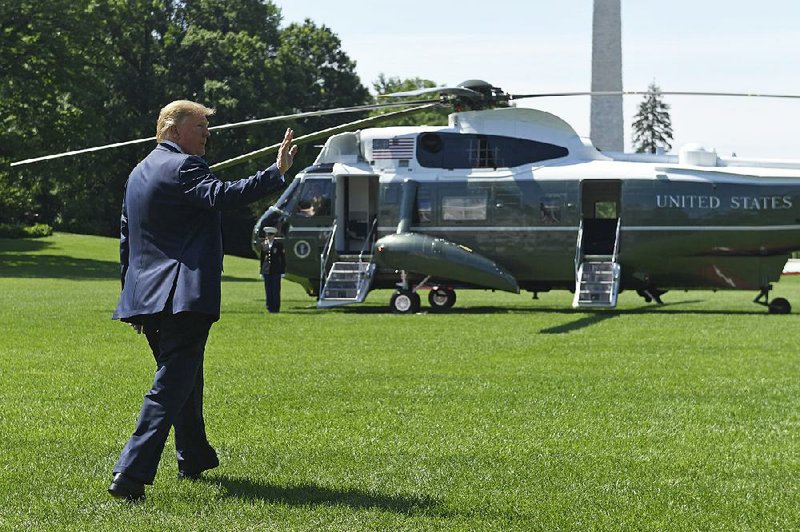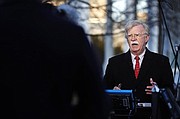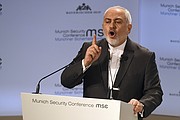WASHINGTON -- President Donald Trump said Saturday that he's still considering military action against Iran after it downed an unmanned U.S. military aircraft last week, saying the use of force is "always on the table until we get this solved."
Trump also said the U.S. will impose new sanctions on Iran today.
Days after initially saying he found it "hard to believe" the shoot-down was intentional, Trump accused Iran of "knowingly" targeting the plane. He reiterated that he aborted a planned military strike set to occur Thursday after learning that it would kill about 150 Iranians.
"I don't want to kill 150 Iranians. I don't want to kill 150 of anything or anybody unless it's absolutely necessary," he told reporters as he left the White House for the Camp David presidential retreat in Maryland. Meetings about Iran were on his weekend agenda, he said.
Trump said "we very much appreciate" a decision by Iran's Revolutionary Guard not to shoot down a U.S. spy plane carrying more than 30 people, though he said the downing of the drone was "probably intentional."
"But regardless, they targeted something without a person in it, without a man or woman, and certainly without anybody from the United States in it. So, we want to be proportionate," Trump said.
The planned sanctions were announced on Twitter with no additional details, but the president had foreshadowed those plans earlier in remarks at the White House.
Trump told reporters that he intended to impose additional economic sanctions and that if Iran's leadership "behaves badly, it's going to be a very bad day for them."
The administration has already applied stringent economic sanctions because of the country's reported support for terrorism, and national security adviser John Bolton and others have made no secret that a goal is to cripple Tehran's oil-dependent economy.
Bolton, whom Trump called a "hawk" Saturday, had called for regime change in Iran before joining the administration. Trump rejects that path but said Saturday that he likes hearing a range of views.
"Ultimately I make the decision. The only one that matters is me. I listen to everybody. I want people on both sides," he said.
Shortly before Trump spoke with reporters Saturday, Iran's foreign minister posted new maps on Twitter that he said offered further details on "the path, location and point of impact" of the U.S. Navy surveillance drone shot down by Iran.
"There can be no doubt about where the vessel was when it was brought down," Mohammad Javad Zarif wrote on Twitter alongside images he said listed the coordinates of the drone as it flew over the Strait of Hormuz.
That "hand-drawn map" isn't credible, said Secretary of State Michael Pompeo, redoubling the U.S. rhetorical hard line after Trump backed away from military action. "Iran's leaders know the truth is a dangerous thing. It is important to correct the record," Pompeo said Saturday in a statement.
The U.S. "has shown beyond any doubt that Iran shot down a U.S. unmanned aircraft in international airspace," Pompeo said. "This attack marks the second time Iran targeted an American unmanned aircraft in recent weeks."
IRAN APPROACHES UAE
The president's comments came as Iran summoned the United Arab Emirates' top envoy to Tehran to protest the neighboring Arab nation's decision to allow the U.S. to use a base there to launch the drone that Iran says entered its airspace, state media reported Saturday.
Iran issued a "strong protest" to the UAE diplomat, saying Iran does not tolerate the facilitation of foreign forces that violate its territory, the report by the official Islamic Republic News Agency said.
The U.S. said its RQ-4A Global Hawk was shot down Thursday over international waters in the Strait of Hormuz, not inside Iranian airspace.
The shoot-down by elite Iranian Revolutionary Guard forces marked the first time the Islamic Republic directly attacked the American military amid mounting tensions over Tehran's unraveling nuclear deal with world powers.
The two countries disputed the circumstances leading up to the Iranian surface-to-air missile shooting down the drone, an unmanned aircraft with a wingspan larger than a Boeing 737 jetliner and costing more than $100 million.
British diplomat Andrew Murrison planned to visit Iran today and call for the "urgent de-escalation in the region and raise U.K. and international concerns about Iran's regional conduct" during talks with Tehran's government, Britain's Foreign Office said in a statement Saturday.
"At this time of increased regional tensions and at a crucial period for the future of the nuclear deal, this visit is an opportunity for further open, frank and constructive engagement with the government of Iran," the statement said.
That announcement came a day after Trump said he had called off military strikes on Iran minutes before they were to be carried out Thursday because it would have been out of proportion to the shoot-down of the unmanned American surveillance drone.
"I didn't like the idea of them knowingly shooting down an unmanned drone and then we kill 150 people. I didn't like it," Trump said Saturday.
Trump said U.S. sanctions on Iran have turned the country into an "economic mess."
Treasury Secretary Steven Mnuchin said Friday that Iran's financial sector would be penalized soon if it doesn't work to stop evading international guidelines designed to combat money laundering.
Since shelving the attack, Trump has appeared to be more focused on continuing to squeeze Iran financially through sanctions. He said Iran would never be a wealthy nation again as long as its leadership remained intent on having nuclear weapons.
"The fact is we're not going to have Iran have a nuclear weapon," the president said on the White House driveway. "And when they agree to that, they are going to have a wealthy country, they're going to be so happy, and I'm going to be their best friend."
The drone incident immediately heightened the crisis already gripping the wider region, which is rooted in Trump withdrawing the U.S. a year ago from Iran's 2015 nuclear deal and imposing crippling sanctions on Tehran.
The president's comments Saturday included an open invitation to Iranian leadership to "start all over" with negotiations on its nuclear program after his decision to withdraw from the multinational pact.
Recently, Iran quadrupled its production of low-enriched uranium to be on pace to break one of the deal's terms by this week, while threatening to raise enrichment closer to weapons-grade levels on July 7 if Europe doesn't offer it a new deal.
On Friday, Iran summoned Swiss Ambassador Markus Leitner to hear Iran's protest over the alleged violation of airspace. Switzerland looks after U.S. interests in Iran. Tehran and Washington have had no diplomatic relations since 1979.
Iran said the U.S. drone was a "very dangerous provocation."
Information for this article was contributed by Darlene Superville and Nasser Karimi of The Associated Press; by Anne Gearan and Erin Cunningham of The Washington Post; and by Margaret Talev, Ros Krasny and Hailey Waller of Bloomberg News.
A Section on 06/23/2019



